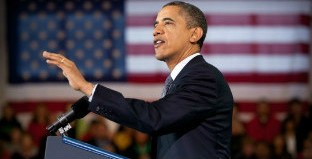Sounding nice and getting tough

Jonathan Chait reads Obama’s Teddy Roosevelt speech Tuesday as a play to position himself against Mitt Romney, robber baron. E. J. Dionne sees a decision to make the election about big ideas--namely, the progessive tradition of fighting inequality. Ezra Klein notes that Obama's message comes in response to Occupy Wall Street; Jamelle Bouie figures this as Occupy strengthening the president's existing hand.
It's all of the above, and yes, it's the most fired up and the readiest to go that we've seen Obama in a good long while:
We all know the story by
now: Mortgages sold to people who couldn’t afford them, or sometimes
even understand them. Banks and investors allowed to keep packaging the
risk and selling it off. Huge bets - and huge bonuses - made with
other people’s money on the line. Regulators who were supposed to warn
us about the dangers of all this, but looked the other way or didn’t
have the authority to look at all.



